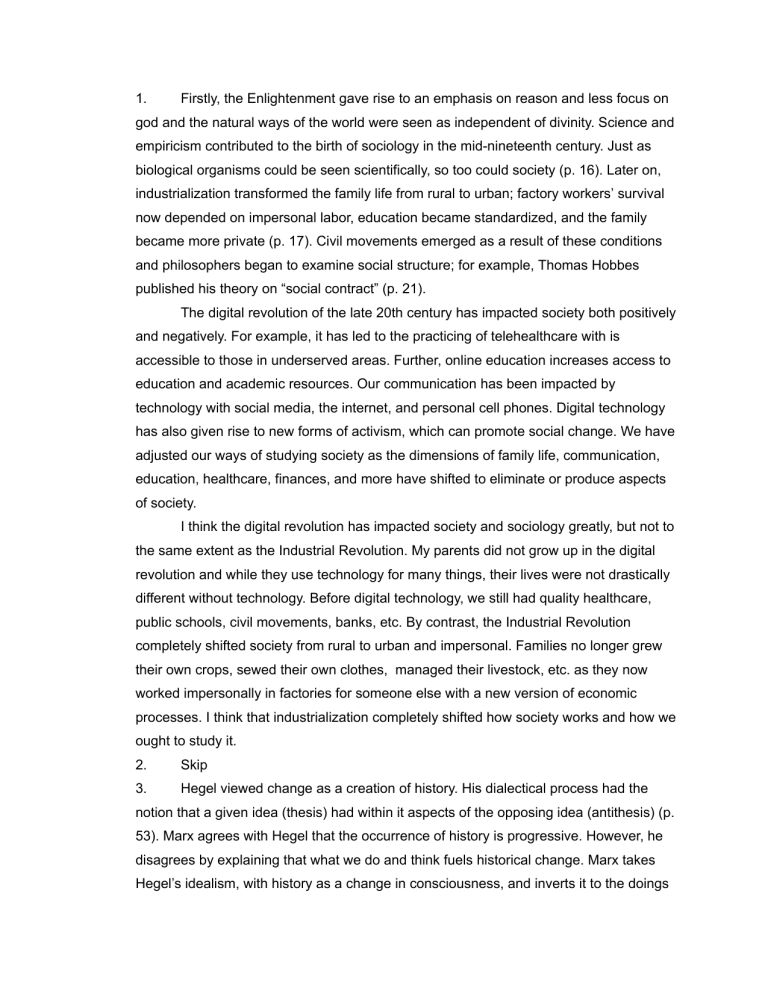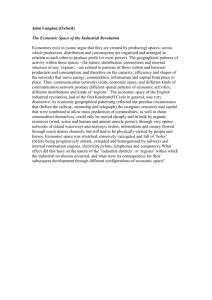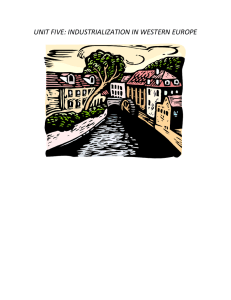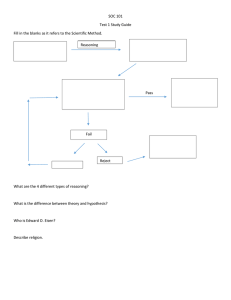Sociology & History: Enlightenment, Industrial & Digital Revolutions
advertisement

1. Firstly, the Enlightenment gave rise to an emphasis on reason and less focus on god and the natural ways of the world were seen as independent of divinity. Science and empiricism contributed to the birth of sociology in the mid-nineteenth century. Just as biological organisms could be seen scientifically, so too could society (p. 16). Later on, industrialization transformed the family life from rural to urban; factory workers’ survival now depended on impersonal labor, education became standardized, and the family became more private (p. 17). Civil movements emerged as a result of these conditions and philosophers began to examine social structure; for example, Thomas Hobbes published his theory on “social contract” (p. 21). The digital revolution of the late 20th century has impacted society both positively and negatively. For example, it has led to the practicing of telehealthcare with is accessible to those in underserved areas. Further, online education increases access to education and academic resources. Our communication has been impacted by technology with social media, the internet, and personal cell phones. Digital technology has also given rise to new forms of activism, which can promote social change. We have adjusted our ways of studying society as the dimensions of family life, communication, education, healthcare, finances, and more have shifted to eliminate or produce aspects of society. I think the digital revolution has impacted society and sociology greatly, but not to the same extent as the Industrial Revolution. My parents did not grow up in the digital revolution and while they use technology for many things, their lives were not drastically different without technology. Before digital technology, we still had quality healthcare, public schools, civil movements, banks, etc. By contrast, the Industrial Revolution completely shifted society from rural to urban and impersonal. Families no longer grew their own crops, sewed their own clothes, managed their livestock, etc. as they now worked impersonally in factories for someone else with a new version of economic processes. I think that industrialization completely shifted how society works and how we ought to study it. 2. Skip 3. Hegel viewed change as a creation of history. His dialectical process had the notion that a given idea (thesis) had within it aspects of the opposing idea (antithesis) (p. 53). Marx agrees with Hegel that the occurrence of history is progressive. However, he disagrees by explaining that what we do and think fuels historical change. Marx takes Hegel’s idealism, with history as a change in consciousness, and inverts it to the doings of man in order to understand the progression of human societies. This inversion shifts from a nonrationalistic orientation (with an emphasis on ideas influencing social life) to a rationalistic understanding that focuses on the pursuit of interests (p. 54). 4. Marx’s concept of the “species being” is that humans are distinct from other animals in that we can purposely intervene in the world through conscious activity, allowing us to achieve our full potential and create relationships with others (p. 51). The idea of alienation refers to workers selling not only their labor, but their souls as they have no connection to what they are producing and their work doesn’t possess any valuable human qualities (p. 44). A worker is disconnected, alienated, from his species being, as “Estranged labor estranges the species from man” (p. 66). Marx further explains that “Estranged labor reverses this relationship, so that it is just because man is a conscious being that he makes his life-activity, his essential being, a mere means to his existence” (p. 66). Labor disconnects our essential being from conscious activity; our consciousness. our life activity, becomes only a means to our existence. 5. Commodity fetishism explains the relationship between production and exchange as a social relationship (amongst things like money) instead of as a relationship between people. This means that economic value is inherent to the commodities instead of from the humans in the workforce who produced such commodities. Commodities are objectified results of a worker’s labor.





